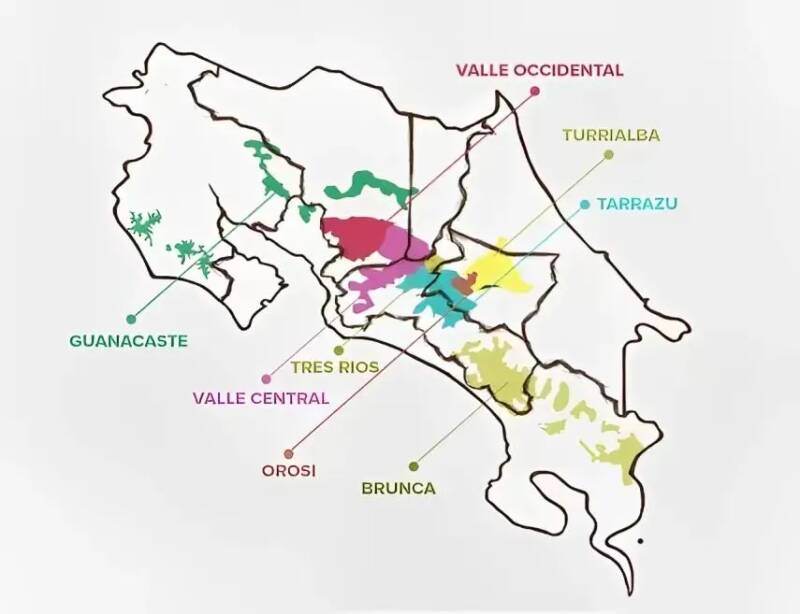Costa Rica's first organic certified coffee estate-Las Haras Estate
Although coffee production in Central America is not high, many coffee-producing countries are famous for producing high-quality coffee. Among them, Costa Rica is rich in natural resources, grows high-quality coffee, and creates a characteristic honey treatment, which makes the coffee beans sweet and rich.
As a result, there are many well-known coffee estates in Costa Rica, such as San Isidro Labrador (Hacienda San Isidro Labrador) and Mirazu (Milasu), many of which come from the largest and most famous coffee producing area in the country, Tarrazu. But other coffee producing areas, although not as well known as Tarazu, can also produce high-quality coffee beans, as well as poor coffee estates, such as Finca Las Lajas in the Central Valley (Central Valle).
Finca Las Lajas, located in the Sabanilla area of Alajuela, not far from the capital, grows coffee 1300-1650 meters at the foot of the Poas volcano. Alajuela is one of the three major producing areas in the Central Valley. Affected by volcanic ash, it has a very fertile and mineral-filled soil, which is very suitable for the growth of coffee trees.

In addition, this is the most unique climate region of Costa Rica, which is like spring all the year round, with very clear rainy and dry seasons. During the rainy season, the total rainfall can reach 3000 mm, the average temperature is 20 °C, and there is sufficient sunshine time.
La Halas Manor has a coffee-growing history of more than 80 years and is currently owned by a third-generation husband and wife, Francesca Francisca and Oscar Chac ó n. In 1995, the father of Oscar, the landowner, died of cancer. They suspected that long-term exposure and use of chemical fertilizers and pesticides on the farm had aggravated the illness. So they began to give up chemical fertilizers and switch to natural and homemade fertilizers, growing coffee under the shade of native forests, and using natural farming methods that protect the ecological environment. After five years of organic cultivation, Las Haras Manor became the first organic certified manor in Costa Rica in 2000, and currently it has passed several organic certifications such as Jas in Japan, USDA and NOP in the United States.
The couple have been trying to improve the flavor of the coffee in the manor. Initially, most Costa Rican coffee beans were washed, and the couple began to study and improve many of the equipment on the estate to better meet the needs of sun and honey-treated coffee. As a result, La Lajas Manor became one of the earliest manors to systematically study and deal with sun and honey treatment.
In addition, the owner of the estate also introduced the sugar meter (Brix meter) often equipped by the wine industry to screen the coffee fruits that reached the standard, determined the best harvest time and treatment method according to the sugar content of Brix, and set up their own processing plant to improve the overall coffee quality of the estate.
At present, many varieties of coffee are grown in Las Haras, including Kaddura, Catuai and Villa Sarchi, as well as SL28 and Obata. The estate has always been committed to environmental protection and sustainable production, and through different treatments to promote Costa Rican coffee, to mention the international influence.
For more information about coffee producing areas, please scan the code directly and follow: coffee comments.
Long press the QR code to follow:
Important Notice :
前街咖啡 FrontStreet Coffee has moved to new addredd:
FrontStreet Coffee Address: 315,Donghua East Road,GuangZhou
Tel:020 38364473
- Prev

Indonesia's new policy leads to thousands of workers 'demonstrations!
According to Indonesian media reports, on October 24, thousands of workers marched in Jakarta, the old capital of Indonesia, demanding that the new government raise the minimum wage and abolish the Job Creation Law, and threatened to launch demonstrations across the country. It is reported that Jakarta police have deployed 1270 joint personnel on bail for this event.
- Next

Full of evil?! Starbucks 'new product becomes "witch soup"?!
▲ Click to pay attention| Daily Boutique Coffee Culture Magazine Coffee Factory Some time ago, Starbucks used the night pumpkin frappuccino sold in Japan last year as the Halloween restricted drink in mainland stores this time, attracting fans to place orders and try it. However, this cold drink cannot be used when the temperature is gradually dropping.
Related
- What grade does Jamaica Blue Mountain No. 1 coffee belong to and how to drink it better? What is the highest grade of Blue Mountain coffee for coffee aristocrats?
- What are the flavor characteristics of the world-famous coffee Blue Mountain No. 1 Golden Mantelin? What are the characteristics of deep-roasted bitter coffee?
- Can I make coffee a second time in an Italian hand-brewed mocha pot? Why can't coffee be brewed several times like tea leaves?
- Hand-brewed coffee flows with a knife and a tornado. How to brew it? What is the proportion of grinding water and water temperature divided into?
- What is the difference between Indonesian Sumatra Mantinin coffee and gold Mantinin? How to distinguish between real and fake golden Mantelin coffee?
- What does bypass mean in coffee? Why can hand-brewed coffee and water make it better?
- Unexpected! Ruixing Telunsu lattes use a smoothie machine to foam milk?!
- % Arabia's first store in Henan opens into the village?! Netizen: Thought it was P's
- Does an authentic standard mocha coffee recipe use chocolate sauce or powder? Mocha Latte/Dirty Coffee/Salty Mocha Coffee Recipe Share!
- What is the difference between Vietnam egg coffee and Norway egg coffee? Hand-brewed single product coffee filter paper filter cloth filter flat solution!

